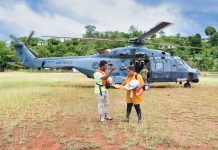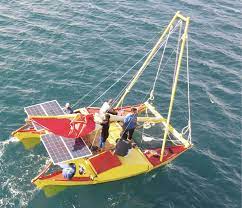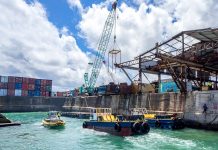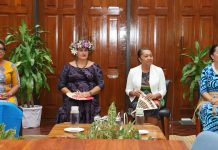The testing of a solar powered outboard engine for a locally built catamaran in Majuro this week is part of a large-scale sustainable ocean transport programme underway in the Marshall Islands that could lead to multiple vessel use of this sustainable energy technology for sea transportation.
“We are developing systems that work for different types of boats in the Marshall Islands,” said Waan Aelon in Majel (Canoes of the Marshall Islands) Director Alson Kelen of the trial of a solar powered engine on the “WAMCat” vessel, a twin hull sailing boat designed and built by the canoe programme for carrying passengers and cargo.
The solar-powered outboard engine project is part of a sustainable transport programme that WAM and others are engaged in locally to develop low-carbon vessel options for the Marshall Islands. It is supported by multiple funders, including the German Agency for International Cooperation, known as GIZ, the Marshall Islands National Energy Office, and others.
For over 20 years, Kelen’s programme has trained groups of young people in a range of life and vocational skills, including how to build and sail outrigger canoes.
Over the past year, the canoe programme has stepped up its work in sustainable sea transport options for remote outer islanders, many of whom are dependent on engine vessels that rely on high-priced fuel. In the past year, the canoe program designed and built three types of boats — and is now training outer islanders to build them in an effort to spread the boat building skills and low-carbon technology to remote islands.
“Our goal is low-carbon, sustainable sea transport,” said Kelen. “We’ve designed and are building three different boats.”
These boats include a Marshallese canoe, 18-foot length, that can carry three men and limited cargo; a 20-foot catamaran that is designed to carry a family and half a ton of cargo; and a “proa,” a larger canoe vessel for lagoon passenger and cargo use as well as for fishing.
The lagoon trials are testing solar equipment that is running a 15hp engine powered entirely by the sun. “We’re testing the speeds at which we can maintain battery levels while using the engine,” Kelen said. Later, they will be testing using both sails and engine together.
In line with its new mission, the catamaran has been named Kõto im Al (Wind and Sun).
Kelen said the current trials of the solar-outboard engine technology is the first step to looking at applying this to other vessels. “Next year, we aim to get an (a 10-passenger) boat and trial the solar-engine,” he said of the type of boat currently in use around Majuro Atoll. The aim is to develop solar-engine options for canoes, boom-boom inboard engine boats, and outboard engine boats of various kinds.
“This technology can help people and businesses save a lot of money,” he said.
The partnership with GIZ has provided this programme with an electrical engineer from Germany who has provided expert advice and worked on the design of the solar-engine equipment in support of canoe programme.
“We’re experts on boats,” said Kelen. “And we’re putting their expertise on power with our knowledge of boats to develop a solution that works here. We are transitioning to a low-carbon future,” said Kelen.
SOURCE: MARIANAS VARIETY/PACNEWS















